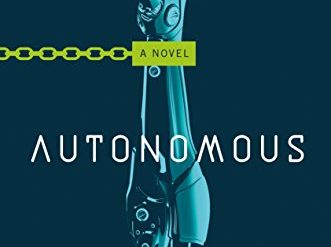Suddenly, with nothing in his medical history to indicate it might happen, the President of the United States slumps to the floor, victim of a massive heart attack. He dies shortly afterward. The postmortem reveals a hugely enlarged organ that bears no resemblance to the president’s heart. Even on the surface, it’s clear that something is amiss. So, it’s no surprise when we learn that President Angel Castro has been the victim of some advance in remote gene editing. The mystery is, who engineered the attack, and how did they perfect such sophisticated technology? Some of the world’s best scientists have failed to make it work. How this all plays out is the central thread in 2054, a novel about the beginnings of life after the Singularity. It’s the fast-moving sequel to 2034 by Elliot Ackerman and Admiral James Stavridis.
The US is again on the verge of civil war
Of course, no one in government dares breathe the word “assassination” in public. Rumors and conspiracy theories are swirling about, of course. The country teeters toward civil war under President Castro’s long-entrenched authoritarian government. His supporters, a party known as the Dreamers, face off against their adversaries, the Democratic-Republican Party, more familiar as the Truthers.
Somehow, the National Security Advisor must get to the bottom of the matter before violence spreads uncontrollably. And for this ultra-sensitive task he turns to staffer Julia Hunt, whose mother played a central role in 2034. Her charge: to track down the elusive Ray Kurzweil, now 106 years of age, somewhere in the vastness of the Amazon. He has reportedly been hiding out there for years as the Singularity he’d long predicted came ever closer to emerging, Everywhere Hunt turns, they tell her Kurzweil holds the key to understanding the origin of the remote gene editing used to murder President Castro.
2054 by Elliot Ackerman and Admiral James Stavridis (2024) 301 pages ★★★☆☆
An overview of the book
This is a complex story featuring a host of independent actors. A billionaire named Sandy Chowdhury and his girlfriend, Iris Bao. Julia Hunt’s boss, Retired Admiral John “Bunt” Hendrickson. Senator Nat Shriver, a great-grandniece of Maria Shriver and the emerging leader of the Truthers. And the Speaker of the House, Representative Trent Wisecarver, the most hawkish of the obstructionists against any the Administration. There are others, too, including a Nigerian financier with his fingers in US politics. You’ll need to follow along closely to keep it all straight.
What’s never entirely clear to me is exactly what advanced remote gene editing is, other than the obvious. How does it work? CRISPR techniques can today be performed “remotely” in the laboratory in several different ways. But the term in the novel implies remoteness at a great distance. All that’s clear (eventually) is that it’s a result of the breakthrough to the Singularity. But whether the force behind the assassination of the US President is human or artificial, isn’t clear, either. This lack of clarity lessens the impact of the story. But it is, still, a good story at heart. It’s suspenseful from beginning to end. My only word of caution is that the book is probably much more enjoyable if first you’ve read 2034. That is, indeed, a terrific story. And the technology portrayed seems all too possible.
About the authors
According to his publisher, Elliot Ackerman has written five other novels and two memoirs as well as coauthoring 2034 and 2054. His books have been nominated for the National Book Award and the Dayton Literary Peace Prize. “He is both a former White House Fellow and Marine,” the publisher notes, “and served five tours of duty in Iraq and Afghanistan, where he received the Silver Star, the Bronze Star for Valor, and the Purple Heart. He is currently a contributing writer at The Atlantic.”
Admiral James Stavridis, USN (Ret.), was formerly supreme allied commander at NATO. According to his publisher, he “spent more than thirty years in the US Navy, rising to the rank of four-star admiral. He previously commanded US Southern Command, overseeing military operations through Latin America. He holds a PhD from the Fletcher School of Law and Diplomacy at Tufts University, where he recently served five years as dean. Stavridis received fifty medals in the course of his military career, including twenty-eight from foreign nations. He has published twelve other books, including 2034, with Elliot Ackerman, and is chief international analyst for NBC News and a weekly columnist for Bloomberg Opinion. He is currently vice chair, global affairs, and managing director of the Carlyle and the chair of the board of The Rockefeller Foundation.
For related reading
Previously I reviewed the coauthors’ novel, 2034: A Novel of the Next World War (The Third World War breaks out in 2034, but not how you think).
To explore the reality underlying the story in this book, see 30 good books about artificial intelligence and especially The Singularity Is Nearer: When We Merge with AI by Ray Kurzweil (Will we merge with artificial intelligence by 2045?).
For more good reading, check out:
- The best techno-thrillers
- The top 10 dystopian novels
- The ultimate guide to the all-time best science fiction novels
- 10 top science fiction novels
- 10 new science fiction authors worth reading
And you can always find my most popular reviews, and the most recent ones, on the Home Page.

































